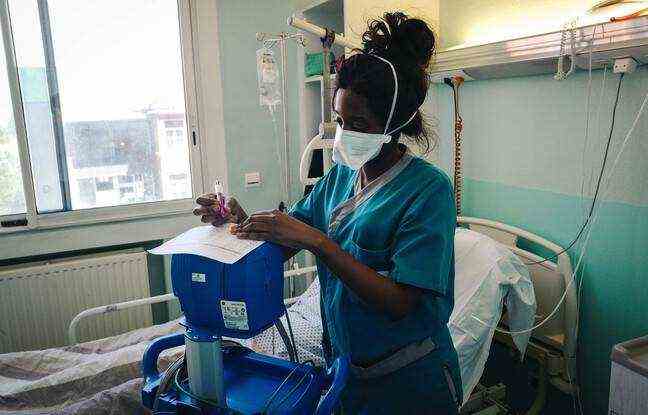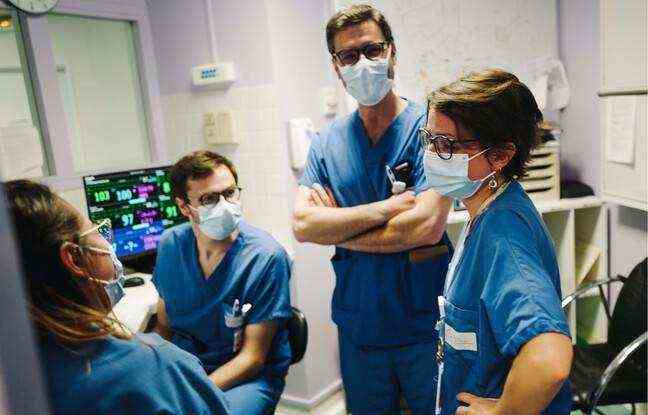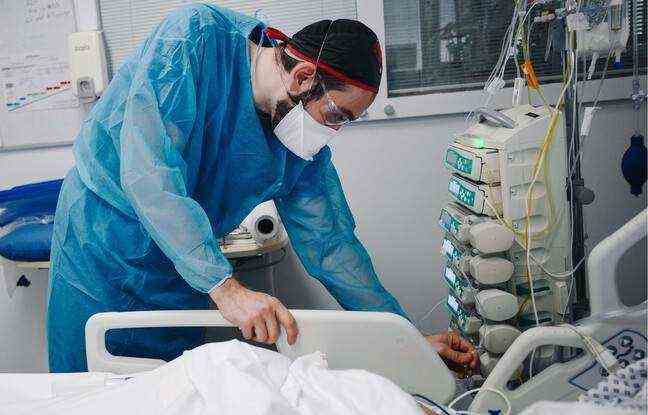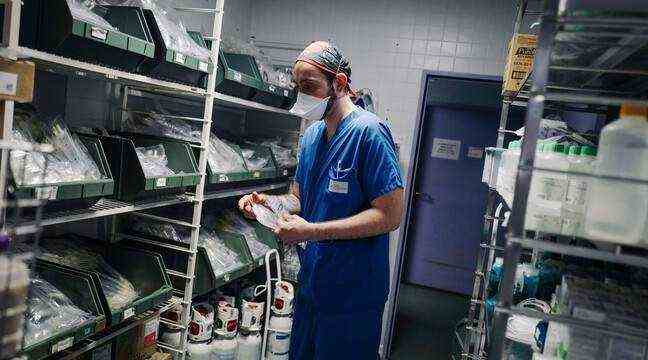Julien Stoltz fell in love with resuscitation, but ensures that monotony and work without breaks or leisure becomes tiring. – Lucas Barioulet / CHI Créteil
- While many caregivers have been sickened by months of merciless – and sometimes without means – fight against the pandemic, the Créteil Hospital Center, in Val-de-Marne, wished to honor its new recruits.
- 20 minutes met Marie, Julien and Nodinne, all three who arrived between the first and the second wave, in 2020, in this hospital. They tell us about their daily life with serious Covid-19 patients, their hope for better days, and their desire for recognition.
“I understand the caregivers who left after the first wave of Covid-19, assures Julien Stoltz, nurse in intensive care at the
Inter-municipal hospital center (CHI) of Créteil ( Val de Marne). I don’t see myself working anywhere other than the public hospital, but I was shocked to see some people treating these quitting nurses as cowards and weak… ”
On the contrary, this 32-year-old nurse, but also Marie Lecronier, 35-year-old resuscitator, and Nodinne Silva, 27-year-old nurse’s aide, joined this hospital in the summer or fall of 2020, with courage in the shoulder. 20 minutes gathered their experiences of the pandemic, after two other waves in this establishment which has 565 beds.
“I discovered a family hidden behind a door once! “
“I’ll bring you gloves and soap,” shouts Niodinne Silva as she leaves room A111. “We are going to sit up in bed, my dear,” explains her colleague to a patient who has just vomited. If Niodinne Silva landed in this hospital, it was primarily for practical reasons. Since July 2020, she has moved closer to her home by taking this post of nursing assistant in the internal medicine department.

“There is a super good team, it’s really a service that I like, even if the day-to-day is tough,” she says. What weighs on him is the aggressiveness of certain patients and the schedules. “The Covid-19 did not disgust me with my job, but the pace is hard to keep up, underlines the young woman, green blouse and high bun. Many of us have had the Covid, so we had to replace ourselves. And with the visits forbidden to families, some do not understand, come in secret. I even discovered a family hidden behind a door once! “
The internal Medicine, Julien Stoltz, nurse, knows well. After having cut his teeth there for six years, he wanted to dive into intensive care. First in Mantes-La-Jolie, then in Créteil since October 2020. “In intensive care, we have quotas of nurses per patient and I wanted a challenge. »Bingo, he falls in love with this service. “It takes a lot of humility because we start from scratch. We discover new devices (dialysis, respirators), drugs, gestures, specific manipulations … Lifting an intubated patient can take half an hour! “
A physical daily life, therefore, but also a school of composure. “You have to know how to react within two seconds when an alarm sounds! It took him about a year to get comfortable. “And God knows I’m not lazy and very invested!” It makes me laugh when Emmanuel Macron makes believe that it takes three days to train nurses in sheaves. A thorny subject, because for months, paramedics have been fighting for a real specialty to be created for nurses.
The risk of weariness and lack of recognition
A fight that Marie Lecronier, doctor in intensive care, supports. She spent two years at La Pitié before taking her post at Créteil in November 2020. What she likes is “the versatility, the autonomy of the caregivers, having exams quickly, various treatments and hard work. team with doctors and paramedics, ”underlines the thirty-something, short brown hair, blue jeans and tennis shoes.

But his service has had to reorganize time and time again, testing new drugs and protocols. “We went from a very varied practice to always the same pathology”, she breathes. If the explosion of March 2020 is now far away and the teams are used to it, we feel, even among these new recruits, that weariness is gaining ground.
“The Covid is becoming less intellectually stimulating,” recognizes Julien Stoltz. We put the patient in “ventral decubitus” and we wait. If this monotony may scare away some interns, whose learning is cut short, the resuscitation of this hospital has had no difficulty in recruiting. “We remain very motivated, even if things have changed,” assures Marie Lecronier. We all had slack this winter, we only worked in a heavy uncertainty. “
An uncertainty which begins, little by little, to disappear. But if the improvement in epidemic indicators gives them hope that the health crisis is receding, they hope that politicians and public opinion will not forget the lessons to be learned. “The crisis has unfortunately shown that paramedics in intensive care were essential,” continues Julien Stoltz. “They may bitch, maybe they were right to fight for the beds after all.” Without us, there would have been even more deaths… ”
The energetic thirty-something does not hide a certain mistrust vis-à-vis the government’s promises. The paramedics of the public hospital saw their monthly salary revalued by 180 euros with the Ségur de la santé. “But we learned that a decree had retroactively lowered overtime increases since February 1. So for four months, we spent our life in the hospital, we saw horrible situations, and now we are asked to return money… ”

“During the third wave, I only saw patients under 65”
Bitterness is also understood on the sudden turnaround in public opinion towards them. In one year, they have the impression of having gone from hero of the Nation to overly cautious killjoy… “The applause, it bothered me, we were doing our job, nuance Marie Lecronier. But we sometimes had the impression that it was because of the hospitals that we were confined. “
“We are the first to want to go out, travel, but we see the reality of the Covid, annoys Julien Stoltz. During the third wave, I only saw patients under the age of 65. Normally, I go to the cinema, to the theater, to friends’ houses. Today, losing a patient takes away a piece of my heart, but nothing can rebuild it. “
Today, the end of the tunnel is emerging, even in these front-row services. With 3,300 people in intensive care last Thursday, against 6,000 just a month ago, caregivers are starting to breathe. “Tuesday evening, I had three patients who were not Covid, it had not happened for months, confirms the resuscitator. We do not say “yay”, because we have already experienced that … But we really hope that there will not be a new wave. And that we too will be able to go on vacation this summer. Well deserved.

